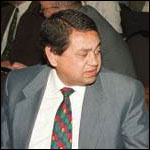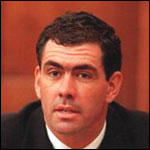New SA Cricket Boss Wants Settlement With Cronje
Paul Martin
Even before Gerald Majola, aged 41, begins his reign as South Africa's new
cricket supremo on January 1 2001, he is willing to court controversy.
In an exclusive interview with rediff.com and Sport Africa Broadcasting,
Majola
urged the world's cricket bosses to end the recriminations over cricket
match-fixing
and csorruption.
"We have to forget the past," the new chief executive of the United Cricket
Board
(UCB) declared. "What is done is done and cannot be undone."
He is not advocating that the guilty go unpunished, but he wants the focus
shifted to
the framework for the prevention of future misconduct. "Our players must
not be
lured into it again," he said.
Majola is the first black man to be put in day-to-day control of the
country's second-
biggest sport. This means he would feel less restrained should he choose
to slam
South Africa's disgraced ex-captain Hansie Cronje and to attack the old
system.
Instead, Majola has chosen, in this interview, to launch what amounts to a
stunning
display of loyalty to the man whose actions plunged world cricket into its
greatest
crisis.

There have been strong and bitter attacks on Cronje as a person and as a
leader,
particularly from UCB president Percy Sonn. But Majola showed a much more
tolerant attitude.
"There must not be a vendetta against him personally," Majola told
rediff.com. "I
cannot write him off as a human being. I cannot hold a grudge against him
as a
person. Yes he is flawed. But he made a mistake like any other human
being. I feel
pity for him."
Majola believes Cronje should be allowed to get involved in some
cricket-related
activities. "No-one can stop him from watching cricket," said Majola, a
reference to
claims that the UCB's ban-for-life included his being barred from any
cricket ground
under the aegis of the national governing cricket body.
He also rejected suggestions, attributed to Sonn, that the UCB would put
pressure on
sponsors and broadcasters not to let Cronje be used as a television
commentator, a
lucrative profession for retired cricket stars.
"Who is to commentate is up to sponsors and television stations," he said.
"They and
they alone can choose."
 Majola revealed that as a deal with the United Cricket Board was being
discussed
between it and Cronje's lawyers. But these were scuppered by the decision
of
Cronje's lawyers to make as a court challenge to the life ban imposed on
the player.
That challenge is still not finalised, though Cronje has won another legal
battle. That
was when his lawyers managed to get as a court in cape Town to rule that
Judge
King cannot re-convene Commission's hearings into Match-fixing and
corruption,
unless Cronje or his lawyers are present. That ruling means there will be
no more
hearings until late in February, when Cronje's lawyers will be available.
Majola revealed that as a deal with the United Cricket Board was being
discussed
between it and Cronje's lawyers. But these were scuppered by the decision
of
Cronje's lawyers to make as a court challenge to the life ban imposed on
the player.
That challenge is still not finalised, though Cronje has won another legal
battle. That
was when his lawyers managed to get as a court in cape Town to rule that
Judge
King cannot re-convene Commission's hearings into Match-fixing and
corruption,
unless Cronje or his lawyers are present. That ruling means there will be
no more
hearings until late in February, when Cronje's lawyers will be available.
Majola feels Cronje's actions now in using the law to protect him will
alienate the
cricketing establishment and the public still further. It made Cronje look
evasive, and
elongated as a process that the public already felt had lasted far too
long.
"If I were him I would have laid low and try to recuperate my public
acceptability,"
Majola stated. He added that it was important for the UCB to talk to
Cronje via his
lawyers, "to avoid him becoming dented as as a human being".
He added: " I still think the UCB should sit down with Cronje after the
Commission
wraps up, and reach some arrangement."
(In another article rediff.com will report Majola's views on how to
transform cricket
and make it the biggest sport in South Africa, and the world leader..)
Mail Cricket Editor
Back to top